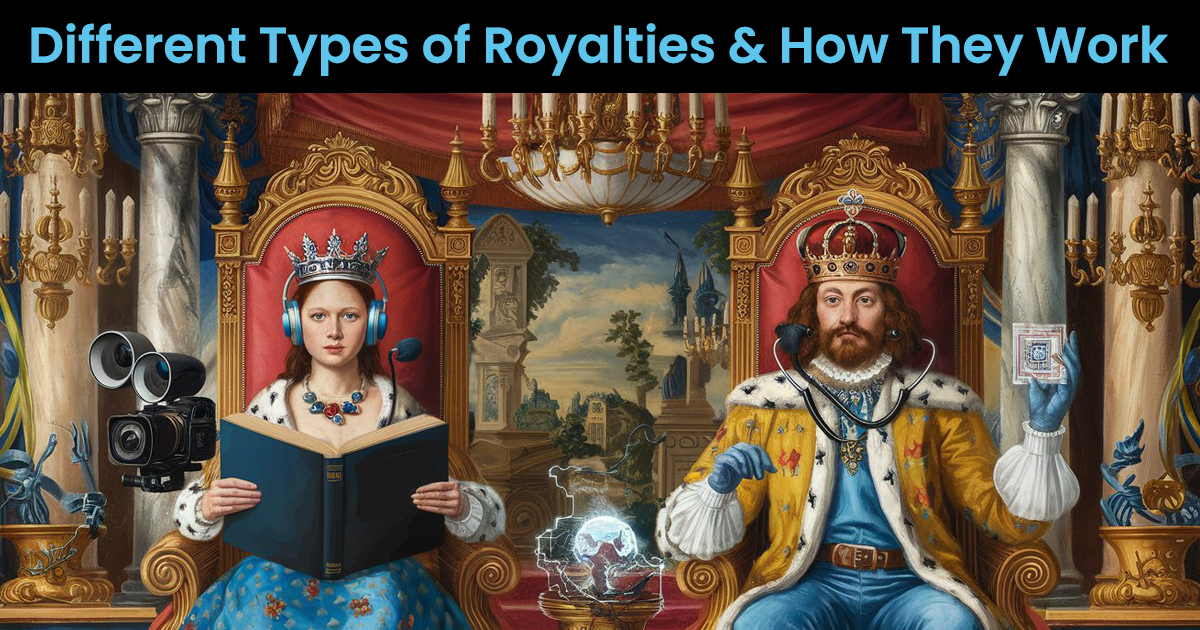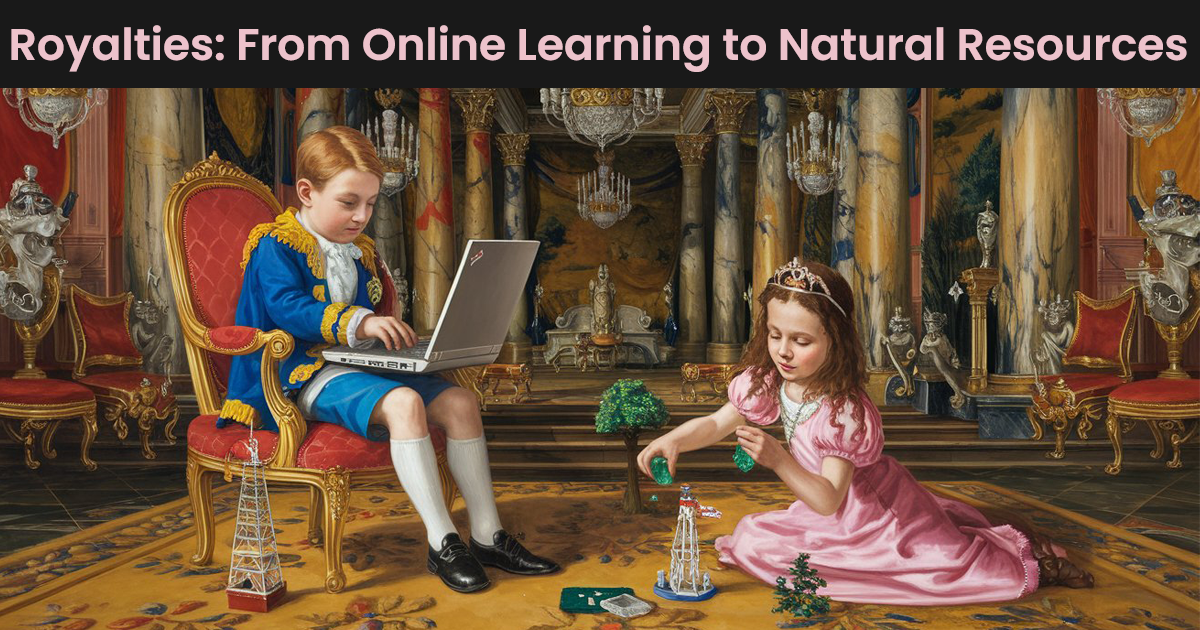Different Types of Royalties & How They Work
Royalties are a crucial element of doing business in multiple industries, allowing creators, innovators, and businesses to earn income for the use of their intellectual property (IP). These payments are made when a third party uses an asset or product that the owner has created or patented. The royalty system helps incentivize innovation and creativity by ensuring that creators are compensated for the commercial use of their work.
In this blog post, we’ll explore the different types of royalties, from creative industries like book publishing and video games to the worlds of science, technology, and natural resources. We’ll cover the key mechanisms of how they work and provide simple examples for each type to give you a comprehensive understanding of royalties in various sectors.
MetaComet’s Royalty Tracker® software manages all types of royalties across publishing, biotech, entertainment, and natural resources with automated precision.
Click below to jump to information about:

1. Media Royalties
a. Book Publishing Royalties
Book publishing royalties are perhaps the most familiar type of royalty. Authors earn royalties when their books are sold, either in print, digital, or audiobook formats. The typical structure involves a publisher paying a percentage of the sales price to the author, although the specific details can vary.
- How They Work: When an author signs a book deal with a publisher, the publisher typically pays an advance against future royalties. Once the book is published and sales reach a certain threshold (in other words, the “advance” is earned back), the author begins receiving royalties, which are typically based on a percentage of the revenue derived from the work.
- Example: Suppose an author signs a contract where they receive 10% royalties on each book sold at $20. If 10,000 copies are sold, the author earns $20,000 in royalties ($20 per book x 10% x 10,000 copies).
- The example above is the simplest possible version of a book publishing royalty agreement. In reality there are many other factors that play into publishing royalty calculations. Learn more about them in our article about Book Publishing Royalties Made Easy.
b. Music Royalties
Music royalties are earned by musicians, songwriters, and producers whenever their songs are played, streamed, or otherwise publicly performed. These royalties are typically split among the various stakeholders, such as the composer, lyricist, performer, and record label.
- How They Work: There are several types of royalties in music:
- Performance Royalties: Earned when a song is played on the radio, TV, live performances, or live-streamed online. These are collected by performance rights organizations (PROs), such as ASCAP or BMI, on behalf of musicians and songwriters.
- Mechanical Royalties: Generated when a song is reproduced in physical or digital form (e.g., CDs, vinyl, downloads, or on-demand streaming).
- Synchronization Royalties: Paid when a song is used in film, TV shows, ads, or video games.
- Example: A songwriter whose song is played on a major radio station may receive performance royalties from their PRO, which collects payments from radio stations based on airplay.
c. Other Types of Royalties in Entertainment
Beyond books and music, royalties extend to a variety of entertainment mediums like films, television shows, and even video games. The structure of these royalties can vary, but the core idea remains the same: individuals or companies are compensated for the use of their intellectual property.
- Film, TV, and Digital Video Royalties: Actors, directors, writers, and other contributors may receive residuals when their films or shows are broadcast, streamed, or sold to a different medium. These residuals are usually calculated as a percentage of the revenue generated by the new use, or by the number of units sold or number of views.
- Video Games: Game developers may receive royalties based on the sales of the games, while artists and designers may earn royalties for their work in the game. For example, if a game is sold for $50, the developer might earn a royalty of 10%, or $5 per copy sold.
2. Science and Technology Royalties
a. Biotechnology Licensing Royalties
In the field of biotechnology, licensing royalties are common when companies or institutions license their patents, research, or inventions to others in exchange for a fee. These royalties are crucial for enabling further development and commercialization of new biotechnological innovations.
- How They Work: Biotechnology companies often license out their patents to other firms, such as pharmaceutical companies, to manufacture and distribute products based on the patented technology. The licensing agreement outlines how much the company will pay in royalties (usually a percentage of the sales price or a fixed fee per product sold).
- Example: A biotech firm that develops a new drug patent may license it to a larger pharmaceutical company. The firm could receive a royalty payment of 5% of the drug’s sales revenue. If the drug generates $100 million in sales, the biotech firm would earn $5 million in royalties.
b. Other Types of Patents
In addition to biotechnology, patents across various industries (e.g., software, electronics, and manufacturing) can also generate royalties. Patents give licensees the right to manufacture, use, or sell an invention for a specified period, and royalties are the compensation paid to the inventor or patent holder.
- How They Work: When a company wants to use a patented technology, they enter into a licensing agreement with the patent holder. In return, the patent holder receives a royalty payment, which can be structured as a lump sum, an upfront payment, or a percentage of product sales.
- Example: If a tech company invents a new processor chip and patents it, they could license the patent to other manufacturers. The licensing agreement might stipulate a 3% royalty on each chip sold, which provides a steady stream of income as the chips are manufactured and sold.

3. Online Learning Royalties
Online learning platforms, such as those offering courses on websites like Coursera, Udemy, or MasterClass, often use a royalty system to compensate instructors for the content they create. Occasionally universities and institutions of higher learning include a royalty component in their compensation packages as well.
- How They Work: When an instructor creates a course and uploads it to an online platform, they typically receive a royalty or revenue share based on the course’s sales. The platform and the instructor agree on a percentage split. Most platforms retain a portion of the sales as their fee, with the rest going to the instructor.
- Example: If an instructor’s course on web development costs $100, and the platform takes a 30% fee, the instructor would earn $70 per course sold. If 500 students enroll, the instructor would earn $35,000 in royalties.
4. Trademark Licensing
Trademark licensing involves the permission granted by a trademark owner to another party to use their trademark (e.g., logos, names, or brand symbols) for specific purposes, usually in exchange for a royalty payment.
- How They Work: Trademark licensing allows third parties to use a brand’s intellectual property to market their products or services. The licensee typically pays the licensor a percentage of the sales or a fixed fee.
- Example: A clothing manufacturer might license the Nike logo to use on apparel. In exchange, they pay Nike a royalty on each item sold, which could be a set percentage of the retail price or a flat fee per product.
5. Franchising
Franchising is another common form of royalty payment, especially in the restaurant, retail, and service industries. A franchisee (the business owner) pays the franchisor (the brand owner) for the right to operate a business using the franchisor’s brand, trademarks, and business model.
- How They Work: In a typical franchising arrangement, the franchisee pays an upfront franchise fee and then agrees to pay ongoing royalties based on a percentage of sales. The royalty percentage usually ranges from 4-10%, but it can vary depending on the industry and franchise agreement.
- Example: A franchisee of a McDonald’s restaurant might pay an initial franchise fee of $500,000 and then continue to pay 5% of monthly sales as royalty payments. If the restaurant generates $1 million in sales that month, the franchisee will owe McDonald’s $50,000 in royalties.
6. Natural Resource Royalties
Natural resource royalties are paid to landowners, governments, or other stakeholders when companies extract valuable resources such as oil, gas, minerals, or timber. These royalties are usually calculated as a percentage of the sales revenue generated by the resource extraction.
- How They Work: In the natural resource sector, companies typically enter into agreements with landowners or governments that entitle them to a share of the profits from resource extraction. These royalties can be based on the quantity of resources extracted, the sales price, or a fixed amount per unit extracted.
- Example: A mining company might pay a government a 10% royalty on the value of the minerals extracted from a specific site. If the minerals are sold for $100 million, the government would receive $10 million in royalties.
The Evolution of Different Royalty Types
Different types of royalties provide unique ways for creative and innovative businesses and individuals to generate income across various industries. With the rise of digital platforms, new royalty models have emerged, particularly in content creation. These models often focus on usage and subscription metrics, reflecting the evolving nature of technology consumption. Royalty management practices are sure to continue evolving in our rapidly changing world, and MetaComet® Systems promises to stay on top of all the new developments.
If you’re interested in learning how we can help your business calculate, track, and pay royalties, please contact us to schedule a discovery call. We provide specialized software that automates royalties for publishing, biotech, and online learning, and we support businesses in other revenue-sharing industries as well.
Check out our Resources section for all the latest royalty information updates.

David Marlin is the President and Co-Founder of MetaComet® Systems, a prominent provider of royalty automation tools. Since founding the company in 2000, David has spearheaded the development of a suite of best-in-class systems that effectively facilitate royalty processes for nearly 200 publishers. David has also served as the chair for The Book Industry Study Group’s Rights Committee and Digital Sales Committee.
Before establishing MetaComet Systems, David served as a technology consultant for renowned publishers, collaborating with notable companies such as Random House, Penguin, HarperCollins, Holtzbrinck, Macmillan, Scholastic, Time Warner, and many others. David holds both an MBA and a BA from Columbia University in New York.
Contact Us
"*" indicates required fields

